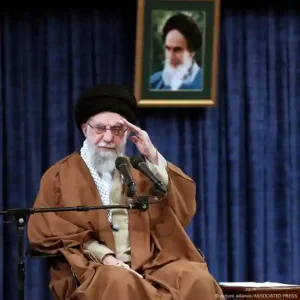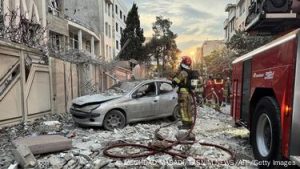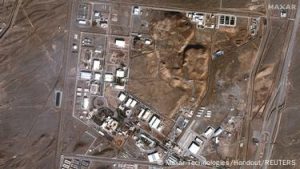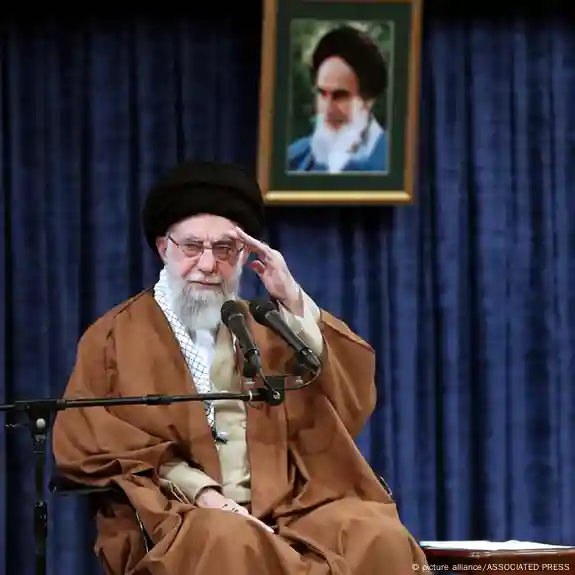
Iran’s Supreme Leader, Ayatollah Ali Khamenei, has said Israel will suffer a “bitter and painful” fate, following Friday’s attacks on Iranian targets. Iran’s military has warned there will be “no limits” to its response.
Israel’s military has said over 100 targets in Iran were struck overnight, which were followed up later in the day by another series of strikes.
The targets included at least six leading nuclear scientists and four senior members of the Islamic Revolutionary Guard Corps (IRGC), who were killed in attacks on residential buildings in the capital, Tehran.
Iranian media have reported that the IRGC commander-in-chief, Hossein Salami, was among those killed, along with top Khamenei aide and diplomat Ali Shamkhani, who also led a committee coordinating nuclear talks.
Iran has characterized the Israeli strikes as a “declaration of war.”
Failed nuclear diplomacy with Iran
“The current situation is the result of a lack of effective and functioning diplomacy between Iran and the US in the nuclear negotiations,” Mohammad Sadegh Javadi Hesar, a former Iranian parliamentarian and editor in chief of the dissident Tus newspaper, told DW.
“This situation has created a space in which Israel is behaving undiplomatically and has drawn both negotiating parties into a military confrontation that neither was desired nor is desired by Iran,” he added.

The US in recent months had restarted negotiations with Iran over Tehran’s nuclear program with the aim of reaching a deal to keep Iran away from developing a nuclear weapon. In 2018, during his first term, US President Donald Trump pulled the US out of a nuclear agreement with Iran that traded sanctions relief for a verifiable Iranian drawdown of uranium enrichment.
Israel views the Iranian nuclear program as an existential threat. The Iranian leadership does not recognize the state of Israel and regularly threatens to destroy it.
However, Tehran officially emphasizes that its nuclear program is exclusively for peaceful purposes.
The International Atomic Energy Agency (IAEA) has a different perspective. According to IAEA Director General Rafael Grossi, Iran is enriching uranium to an extent that exceeds that of all other non-nuclear weapon states.
In a resolution on June 12, the UN nuclear watchdog declared for the first time in almost 20 years that Iran had violated its nuclear non-proliferation obligations. This provides an opportunity to refer the case to the UN Security Council.
In response to the IAEA’s condemnation of the lack of cooperation, the Iranian Foreign Ministry and the Atomic Energy Agency jointly announced their intention to build a third uranium enrichment facility “in a safe place.”
Javadi Hesar, an Iran-based political critic, told DW that the IAEA ruling has allowed Israel to legitimize its strikes on Iranian nuclear sites.
“Israel can now claim that even the IAEA has determined that the Iranian nuclear program is neither predictable nor controllable. Therefore, it is necessary to strike preemptively and destroy Iranian nuclear facilities out of self-protection,” Hesar said.
“To prevent this escalation from turning into a major war, and to keep the confrontation between Iran and Israel at a low and limited level, the US government — as Iran’s negotiating partner — should quickly condemn Israel’s actions and make it publicly clear that it was not involved in this attack,” he added. Secretary of State Marco Rubio later on Friday said the US was not involved in supporting or orchestrating the strikes.

IAEA chief Grossi, meanwhile, condemned the attack on Iran’s nuclear program.
On Friday, he stated that, according to the Iranian authorities, the uranium enrichment plant in Natanz had been hit by the Israeli attacks.
Israel claimed the facility had been “significantly” damaged. The IAEA has not seen increased radiation levels at the site.
A second facility in Fordo and the nuclear center in Isfahan were not affected as of Friday afternoon.
How could Iran respond to strikes on nuclear program?
Iran has spread its nuclear facilities over several locations, some of which are in underground bunkers, which makes it difficult to completely destroy them.
If Iran’s nuclear facilities are attacked, Iran has little choice but to strike back for internal political reasons, according to Arman Mahmoudian, Iran expert at the University of South Florida.
He added Iran is concerned about a development similar to the Syrian war, in which Israel destroyed several nuclear facilities under construction.
“Iran feels compelled to send at least a limited but clear countersignal in order to prevent further attacks. Israel, in turn, could expand its operations and target Iran’s electricity and oil infrastructure in order to increase the pressure on Tehran on a daily basis,” Mahmoudian told DW.
Iran’s first reaction was to fire more than 100 drones at Israel, all of which were intercepted outside Israeli territory, according to the Israeli military.
The Iranian armed forces released a statement saying that Tehran had “no restrictions” in its response to Israel’s strikes.
Iranian Defense Minister Aziz Nasirzadeh has said that “new” weapons had been tested and handed over to the armed forces. Iran has also called for an emergency meeting of the UN Security Council.
What is the role of the US?
US President Donald Trump on Friday took to his Truth Social social media platform and called on the Iranian leadership to make a “deal” and warned otherwise of “even more brutal” attacks.
“There has already been great death and destruction, but there is still time to make this slaughter, with the next already planned attacks being even more brutal, come to an end,” Trump posted.
Trump told US broadcaster CNN on Friday that the Israeli strikes were a “very successful attack” while it was left to Rubio to confirm the lack of US involvement.
The office of Israeli Prime Minister Benjamin Netanyahu said that the prime minister will speak with Trump at some point on Friday.
“So far, Iran has not wanted to be drawn into a direct military conflict with the US, which would be an extremely risky undertaking,” said Iran expert Mahmoudian.
“However, there is a difference between the US merely supporting Israel and actively getting involved in a war with Iran,” he added.
To completely destroy Iran’s nuclear facilities, Israel would need more advanced weaponry that only the US would be able to provide.
Should such involvement occur, Iranian retaliation would likely also target US facilities in the region, which would further destabilize the already tense situation in the Middle East.
This article was originally written in German
DW News


